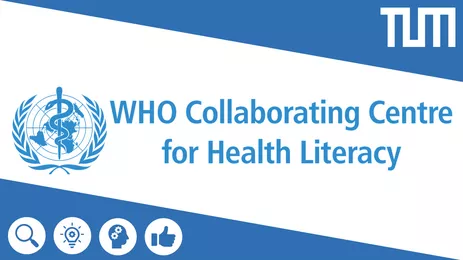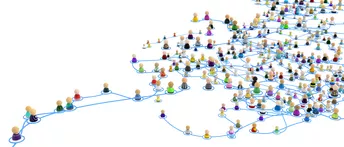Welcome to the WHO Collaborating Centre for Health Literacy at the TUM School of Medicine and Health (TUM SMH), Department of Health and Sport Sciences, Health Literacy Unit. The status of a WHO CC was granted on 8 December 2023 and will run until 8 December 2027, under the WHO`s reference number DEU-147. The WHO CC is headed by prof. dr. Orkan Okan, who is also the head of the Health Literacy Unit at TUM SMH. At WHO HQ, the WHO CC for Health Literacy is supervised by Dr. Faten Ben Abdelaziz in Geneva (WHO Department Health Promotion, Director Dr. Rüdiger Krech). Dr. Anastasia Koylu is her technical counterpart at the WHO Regional Office for Europe in Copenhagen.
The Shanghai Declaration on health promotion (WHO 2016) and the Global Framework on achieving wellbeing adopted at the 76 World Health Assembly highlight that health literacy is a key strategy to better achieving health promotion, disease prevention, and health care goals. Health literacy is also an important determinant of health and well-being. In order to respond effectively and sustainably to the global challenges associated with health literacy and based their mandate for health literacy, the WHO plans to develop and implement an agenda to strengthen health literacy. In Europe, for example, this has resulted in the WHO Health Literacy Road Map (WHO, 2019) and the WHO Resolution for Health Literacy (WHO, 2019), which was signed and ratified by all WHO European member states. This is intended to support the WHO member states in particular in the development of national strategies and political programs to promote healthier populations and living environments through health literacy.
Pursuing this goal on a global scale, population data on health literacy is required to better understand health literacy needs of individuals and form target group adjusted health literacy interventions. Yet, most countries have no data and clear agenda on assessing and promoting health literacy in a systematic manner. Countries that have assessed population level heath literacy have realized that on average, in most of the countries populations have lower levels of health literacy, which makes it difficult for people to manage health information, take health decisions, and sustain healthy behaviours. This is shown, for example, by the studies of the WHO Action Network on Measuring Population and Organizational Health (M-POHL) in Europe and the studies of the Global Health Literacy Research Network, the latter of which is coordinated by the TUM Health Literacy Unit in cooperation with Fulda University of Applied Sciences and Trier University. In some countries, this has led to the development of national strategies and action plans to enhance population health literacy levels. However, sustainable promotion of health literacy has to start early in life and ideally in schools and pre-schools as shown in a WHO report on school health literacy co-developed by the TUM Health Literacy Unit. Most countries fail to address health literacy in their education system. The main goal of this WHO CC for health literacy is to respond to these shortcomings by providing technical support to WHO through the:
- review of health literacy evidence and technical input to inform the development of a global agenda on health literacy
- development of a global tool to assess population-level health literacy and implementation of a global population health literacy survey
- development of a global tool to assess school children's levels of health literacy and implementation of a global school health literacy survey
- development of a framework of health literacy competency standards for young people to navigate emergencies
The WHO CC HL will work closely with the Health Literacy Section of the European Public Health Association (EUPHA), the Global Health Literacy Research Network (GLOBHL), the WHO Action Network on Measuring Population and Organizational Health Literacy (M-POHL), the International Health Literacy Association (IHLA) and the National Action Plan on Health Literacy (NAP) to address these tasks and objectives. In addition, experts from academia, practice, and policy will be consulted and invited to actively collaborate with the WHO CC HL.
If you are interested or have any inquiries, please send an e-mail to Prof. Dr. Orkan Okan or secretary Daniela Märkl.






